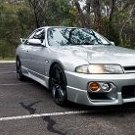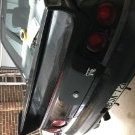Reliable R33 Mechanic
Announcements
-
Similar Content
-
Latest Posts
-
By Dose Pipe Sutututu · Posted
The German place in Cabramatta was rock solid, fresh pretzel cooked to order back then. Then it went all quiet, after all the poker machines were removed, then I believe it closed for good. I did drive past the other week and noticed outdoor lighting a big screen, but no idea what is there now. -
By joshuaho96 · Posted
Yeah I suspect even if you hold airmass per cycle/cylinder constant if you get too far away from stock you're still going to have problems running the factory tune within the bounds of the factory load scale. Cams, different displacement/rod ratio, etc. I'm just lucky that the GTIII-SS with wastegate boost + CA compliance cats is pretty much equivalent to stock turbos. When I have actual space I can finally get it tuned and modify the fuel system for flex fuel to 100% handle any detonation concerns when cranking the boost to whatever those dinky turbos can put out. -
I would say no, why, because my daughter, who also lives in Goulburn, hasn't recommended us going there Pity, as we miss all the German joints around in Sydney, actually, the restaurants are the only thing I really miss about Sydney, and a special mention to Ishibanboshi at Bondi Junction, their Kara-age Don is heart cloggingly deliciousness (always added a special boiled egg...or 2) 😋
-
Does that German restaurant still exist in the old place out the NW end of Goulburn? When I say "out the NW end of"...I am really being vague. It was 1997 when I was last there, and the only point of reference I can recall is that it was on the opposite side of the main drag from the big merino. And when I say "opposite side of the main drag", I don't mean "on the main drag". It was either a couple of streets back from there, or might have even been out in the sticks a bit further. Was an old farm building or mill or somesuch. And when I say "the big merino" I might actually be thinking of a completely different part of town, because I just looked on maps and the big bugger is not where I remembered him to be! The food was good, consisting largely of various German mystery-meat sausage/loaf things and kartofflen.
-
So while the second sentence is completely correct and the whole point of the conversation, the first sentence bears consideration. If this bloke is just hoping to throw big turbos on and drive it around, because there are no helpful facilities at all in his tropical paradise** then he likely has zero chance of even knowing what the TP is on the last column in the stock maps, let alone know whether the ECU is operating anywhere near it or past it. So the point is very very moot. And, per what I said before, at stock boost on those turbos, you may well be off the end of the map. **I'm just back from Vanuatu, so I know exactly what small Pacific nations can be like wrt paradise without requisite facilities. But it's not even that simple. I put a high flow on my car and had to drive it around without a proper tune because of the lack of opportunity*** to put the bigger AFM and injectors into it to allow it to be tuned. I had to turn the boost down to less than I had before, and back off the boost controller's ramp, because it was exploring parts of the map that it didn't drive in before, and really couldn't access for tuning on the dyno either, and so was pinging. It was still well within the last column, because when I first**** set up the Nistune on the Neo I rescaled all axes of the maps to give some more space to explore. ***Family dyno was broken ****This was 13 years ago, and the TIM thing wasn't a thing then and so TP would definitely grow when pushing past the stock tune's limits.
-







Recommended Posts
Create an account or sign in to comment
You need to be a member in order to leave a comment
Create an account
Sign up for a new account in our community. It's easy!
Register a new accountSign in
Already have an account? Sign in here.
Sign In Now